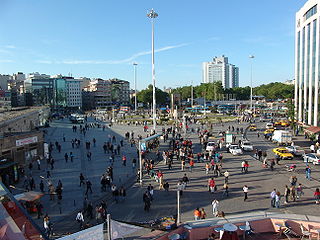Turkey – what is to be done?
Turkey – what is to be done?
Unrest in Turkey continues. The big question is this: what can the member states of the European Union, for membership of which Turkey is an applicant state, do? It’s obvious that Turkey’s accession is further away than ever, but beyond that, what should be done? It’s a dilemma seen often enough in relation to human rights policy: doing nothing isn’t an option, but doing too much can make matters worse. Last week in the European Parliament we condemned Erdogan’s actions in Istanbul. Although the EP hadn’t got all that much to say, Erdogan reacted as if a snake had bitten him, which is just fine. Further to this I’ll be strengthening my contacts with representatives from the various Turkish groups, so that they know that they don’t stand alone. In my view, however, sanctions would be premature.

Caption: Taksim Square (source: wikicommons)
 There are reports that the first refugees from Istanbul are heading for Europe. Freedom to demonstrate and freedom of association are being grossly violated. Religious minorities such as Christian and the traditionally large Alevish community are extremely worried. The Kurds are conducting peace talks with the Turkish government, but the process lacks any transparency and gives every appearance of having hit a red light. At first glance, these are sufficient reasons for the EU to suspend its Association Agreement with Turkey.
There are reports that the first refugees from Istanbul are heading for Europe. Freedom to demonstrate and freedom of association are being grossly violated. Religious minorities such as Christian and the traditionally large Alevish community are extremely worried. The Kurds are conducting peace talks with the Turkish government, but the process lacks any transparency and gives every appearance of having hit a red light. At first glance, these are sufficient reasons for the EU to suspend its Association Agreement with Turkey.
The reality, however, is rather more complicated. The Turkish community in Europe wants to see change in Turkey, yet I have received no calls to urge the breaking of ties with their country of origin. To suspend the Association Agreement, or sections of it, would be to push Turkey away from Europe and the chances of helping the people there with it. For the time being, that doesn’t appear to be the way forward.
In addition there is the fact that the situation in Turkey is immeasurably complex. As a socialist party we sympathise with the people of the Turkish countryside who have for years profited hardly at all from economic progress. Erdogan is attempting to provide them with new opportunities and in itself that’s good, but it’s a shame that the conservative wing of Islam also wants to do so, with strict legislation against alcohol an example of this. It’s fine for people to want to hold to certain religious rules, but people who have other beliefs or no religious beliefs should be free to express themselves and act as they wish, including in the consumption of alcoholic drinks. In my view church and state should be separate. Erdogan might be a conservative Muslim, fine, but he should also be a Prime Minister for those whose beliefs differ, and not only in word, but in deed.
Our solidarity is with the people who are continuing to demonstrate in many Turkish towns and cities, despite the disproportionate police response. So I won’t be passing up any opportunity to develop closer contacts with Kurdish, Alevish, Christian, LGBT or other organisations in Turkey. This isn’t difficult, because many such groups are visiting the EP on an almost daily basis. Do they need financial or material support? The EU can provide it. In two weeks we will be meeting again in plenary, and can if necessary renew our condemnation of what’s going on, but far-reaching steps don’t seem to me, as things stand, appropriate.
- See also:
- Dennis de Jong
